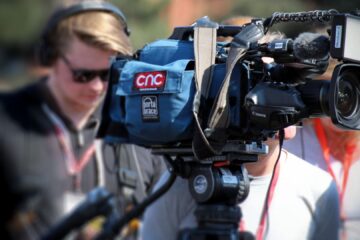![]()
Introduction:
What is media? Generally, media is a way or platform mainly used to collect, store, and share information with the public. The term media has a wide scope and includes print media, news media, publishing, photography, cinematography, broadcasting, and advertising. The nature of media is dynamic and keeps changing from time to time. Change and growth in the media sector is inevitable. Media can be divided into four parts: Traditional Media, Print Media, Electronic media, and Social media.[1]
Politics refer to the activities related to forming a government in a country or any part of a country involving disputes between parties having power. The influence of media on politics is very significant, especially in an era where most people receive news through print media or electronic media. Media and Politics can be considered as two sides of the same and neither one can persist without the other. Indian Politics has undergone tremendous change in the past few decades, and this would not have been possible without the media of the nation. Media acts as the fourth pillar of the nation along with playing the role of the platform that keeps the citizens updated about the current events in politics.
Media and Politics
As already stated, it is impossible for politics and media to persist without the other. Media plays a very crucial role in defining the politics of a country alongside influencing public opinion towards the government as well as other parties. With the demand for more transparency and freedom, it is almost impossible for any government to control the public on media platforms such as Facebook and Twitter, radio stations, and other forms of press.[2]
The press or media of a country has a powerful influence over the politics of a country. Thus, the media is given a certain special power in any political system as it serves as the main and primary source of information to a large section of the population. Over the years, media has proved to be the most powerful way of inducing changes in public attitudes, opinions, and behaviors to ensure the continuity of progress in the nation. India, being a democracy, has its own challenges with people coming from diverse backgrounds and cultures. The media plays a very important role in ensuring that all events and latest technologies reach the public to keep them up to date and influence their understanding of how the world works. The media also helps the public to cope up with all the challenges as well as the opportunities that come with the induction of modernization in Indian societies. This helps lawmakers to understand the behavior of the public and make legislations accordingly and indirectly ensures the smooth relation between the lawmakers and common folk.
The persuasiveness of the media and its impact on politics has been a controversial topic of discussion for decades. The freedom and limitations levied on the media of a country significantly determines the character of the government of that nation. Depending upon the situation, the government takes up the roles of pro group or pressure groups towards media. This association between the government and the media has a major role in effecting the thoughts and beliefs of the public. Hence, media is one of the most powerful tools that a government can use to gain the confidence of the people and the most effective tool that the public can use to ensure the smooth running of the country.
Currently, the most common form of media used by a majority of the population to get updates about the current affairs and politics are social media platforms such as Facebook and Twitter. Political parties have started communicating with the public in a way that has never been adopted before. Social Media usage of the current and upcoming generations only keeps increasing and political parties have used this fact to their advantage and extended their reach, bridging the gap between political parties and the public significantly. The use of such media has resulted in easy communication with target groups allowing advocacy of their policies on a wider scale.
In 2014, the first Lok Sabha elections were held through social media giants, specifically Twitter and Facebook. It involves around 1.2 Billion users being from both rural and urban areas of the nation. Social media is tremendously utilized by the politicians for Marketing and publicity, an act which was primarily carried out by Print media, electronic media, and other forms of communication. This made social media a new battleground for politicians to gain the confidence of the public.
Finally, the media also helps in ensuring transparency and accountability. It informs the public of the affairs of the government and the possible impacts of those actions. It pays the role of the communicator of information and ideas. It does this either by providing information and explaining its background and effects or by comment.
Considering the points stated above, it can be assumed that the media plays a very important role in influencing the politics of a country by:
- Holding political leaders accountable to the people for their actions.
- Publicizing and creating awareness about issues that need immediate attention.
- Educating citizens so they can make informed decisions, and
- Connecting people with each other in civil society.[3]
It is established that the existence of a free and fair media is of utmost importance for politics since this helps in facilitating the inclusion of the public in politics including gaining membership in political parties, ensuring that voters vote, taking part in the election campaigns of political parties and more. This is only because the media keeps informing and updating the masses about the true state of the affairs of the government hence, keeping the powerful also in check. The citizens rely on media to hold the government responsible while putting in minimal effort.[4]
Conclusion
In conclusion, the role of media in influencing the politics of a country is very crucial. Media has a very significant impact on the attitudes of the public regarding political parties and their agendas. This is why a fair media is essential to ensure the growth and development of the nation. This requires a set of specific rules and regulations to be imposed on media to oversee what is being imparted to the public and restrict false information that could lead to public unrest. The existence of an unbiased system of media is quintessential for showing the public the harsh realities in the world of politics.[5]
References:
[1] THE IMPORTANCE OF MEDIA IN POLITICS, https://www.researchgate.net/publication/319629909_THE_IMPORTANCE_OF_MEDIA_IN_POLITICS
[2] The role and importance of media in Indian politics | International Journal of Recent Scientific Research Recentscientific.com, http://recentscientific.com/role-and-importance-media-indian-politics
[3] The Role of the Media in Politics Ethics Sage, https://www.ethicssage.com/2016/10/the-role-of-the-media-in-politics.html
[4] John Zaller, A Theory of Media Politics (1999).
[5] Role Of Media In Politics Media Essay UKEssays.com, https://www.ukessays.com/essays/media/role-of-media-in-politics-media-essay.php



0 Comments